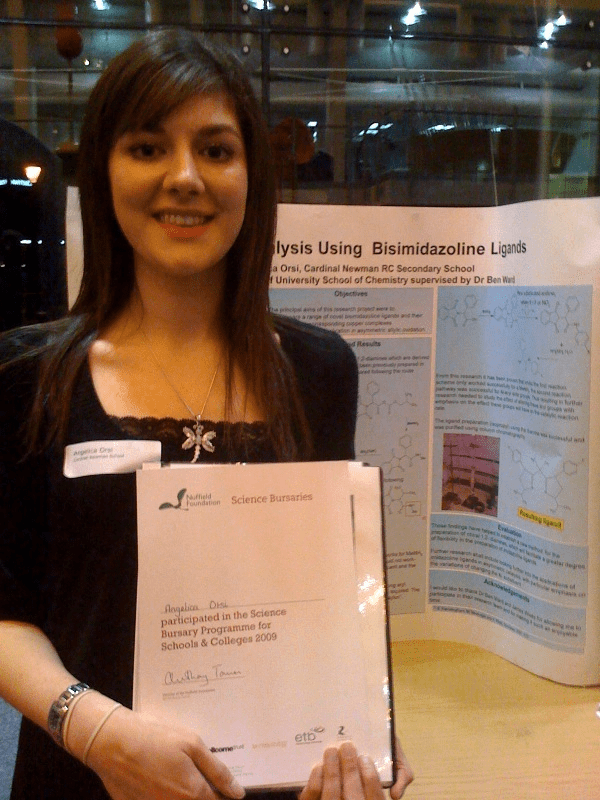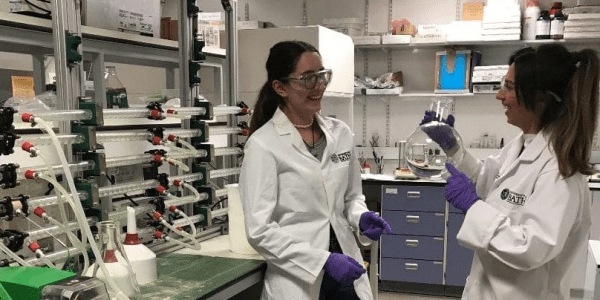Angelica Orsi’s placement at Cardiff University’s School of Chemistry
| Nuffield Research Placement student, 2009
School of Chemistry, Cardiff University 2015-2017 SCI Scholar |
|---|
The six-week research project was based on asymmetric catalysis using bisimidazoline ligands and was carried out in the catalysis group of Dr Benjamin Ward at Cardiff University.
What was the highlight/best bit of your placement?
The Nuffield Science Bursary placement presented my 17-year-old self with a first encounter of a university research laboratory, which in hindsight solidified my decision to choose Chemistry as my chosen subject for university applications. During my research placement, I enjoyed learning to use the pieces of equipment and characterisation techniques that I had previously only seen in textbooks. Producing a research poster based on the NRP work and explaining it to an audience at the Wales Regional Nuffield Celebration Event 2009 was exciting and achieving a CREST Gold Award was very rewarding.
As the Nuffield Research Placement is competitive, winning the placement encouraged me to seek and apply for other opportunities and today I am currently a 2015-2017 SCI Scholar (only 3 are chosen each year in the UK).Angelica Orsi
What is your current role? If you are currently studying, what course are you doing?
Currently, I am a 2nd year PhD student at the University of St Andrews. My research is on the synthesis of porous metal-organic frameworks (MOFs) for CO2 capture in the group of Professor Paul Wright and is part of an EU consortium, “Energy Efficient MOF-based Mixed Matrix Membranes for CO2 Capture”.
What path did you take after finishing your NRP and how has that led you to where you are today?
After my NRP, I completed my A-levels (Maths, Chemistry and Physics) and went on to attain a First Class Masters Degree in Chemistry with Industrial Placement from the University of St Andrews.
The laboratory experience that I gained during the NRP greatly aided my undergraduate laboratory sessions, especially since I directly went into 2nd year. I had a good foundation in laboratory report writing, poster presentations and communication of scientific knowledge all from the NRP. Additionally, as the NRP is competitive, winning the placement encouraged me to seek and apply for other opportunities and today I am currently a 2015-2017 SCI Scholar (only 3 are chosen each year in the UK).
If you could give one piece of advice to Nuffield students about to start a placement what would it be?
Firstly, congratulations on being given such a prestigious award! Take every opportunity that you are presented with, even if it is out of your comfort zone, and do not be afraid of failing or making a mistake. This is all part of a learning curve and is a stepping stone to your future career.
What would your advice be to young people thinking about a career in STEM?
A young person should seek as much information as possible from the internet and scientific organisations, especially if one’s school has limited STEM teaching & careers advice (as mine did)! My local careers centre could only offer advice on medicine or dentistry and could not even suggest scientific companies in my area that perhaps I could have visited. This is why the Nuffield Bursary opportunity was so important to me. It allowed me to experience a research laboratory working on real-life problems and getting to talk to top people in their scientific fields. Also, find out where and when scientific fairs & lectures are taking place and go to them.
I would like to thank the Nuffield Foundation for sponsoring me to carry out a research placement back in 2009. It formed the basis of where I am now in Chemistry research and I hope that many other students will continue to have this exceptional experience.




